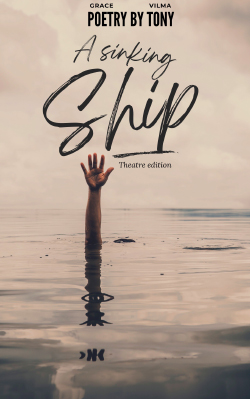By Afraa Kori
Life just became dark. Like a thief in the night, depression and anxiety crept in blinding him to the beauty of life. Tony Akaro attempted to take his own life but failed. Or, miraculously survived.

But the beloved UK poet is not alone. “Recently it has come to my attention the number of South Sudanese men suffering from mental health issues, causing many to eventually commit suicide,” he says.
A comprehensive study of mental health of refugees both in Australia and internationally has found almost one third experience depression and post-traumatic stress disorder, highlighting the need for long term mental health support for refugee communities.
Tony has discovered that his childhood passion can be a lifeline. He has been writing and performing poetry for just over a decade, including a performance at the African Union 50th anniversary in Ethiopia. He’s also published two poetry books, a spoken word album, and two EPs.
Two years ago, Tony decided to bring poetry to the theatre to support men’s mental health, evolving into his concept A Conversation With T, where he was working alongside other poets to creatively tell their stories.
He thought it would be “unjust” not to share how he overcame depression and anxiety as a Sudanese man. “I believe every artistic expression is an exhibition of finding oneself,” he says. “There is no harm in offering light to someone who is stuck in a dark place.”
“Sometimes you need your wounds to be publicly exposed to heal better,” he says. “I am not vulnerable in my poetry because I want to be, but rather because I have to be. Most men don’t share their experiences because they don’t want to, but rather because there is a lack of representation as well as a lack of love, which I intend to fill.”
The suffering of Sudanese-Australian men inspired him to bring his message to Australia, where he hoped to connect with “those who may be struggling with something similar or know someone who does.”
He put together an open mic show in the “hopes of encouraging whilst giving the community a voice” through poetry, music and arts.
THE SHARED JOURNEY
The African-Australian community was the first to teach him that “love knows no boundaries.”
As his popularity grew, those who had come across his videos could see how he exemplifies mastery of his craft as a person who openly shares their mental health journey and leverages their platforms to advocate for and raise awareness of this important issue.
Sudanese-Australians like Flabia Orison, have been following Tony’s poetry online since COVID-19 pandemic.
“It was as if I were seated in the audience, absorbing every syllable, prompting me to reach out and let him know how deeply his words resonated with me,” she says. “This subject matter carries significant weight, and I feel like his distinctive storytelling, infused with wit and artistic flair, sets him apart, making his advocacy efforts truly unique.”
This led to a private conversation between Flabia and Tony where they discovered mutual interest in mental health and self-development, aligning with her work as a youth and community facilitator and art connoisseur.
This inspired her to invite him to join her in a live open discussion where Tony and others shared personal experiences and perspectives on how their community addresses mental health concerns.
“It became evident that this is a shared journey among Africans in the diaspora,” she says. “Despite residing in different corners of the globe, our shared African heritage unites our experiences as individuals striving to adapt to new environments while grappling with cultural norms that inhibit open expression of mental health challenges.”
With the success of their online forum, Flabia was even more eager to attend his first debut in Australia and “soak in every moment.”
THE REAL ENCOUNTER
Just hours after landing on Australian soil Tony swapped his suitcase for the mic, excited to release his artistry on stage. This moment marked a turning point for the Sudanese community. As his words poured out like a river, tears and laughter flowed from the audience, forming an unspoken bond, and understanding that only comes from walking in the same shoes.
Kuti Kalo, a content creator and photographer from the western suburbs, describes it as a moment that will stick with him for a long time.
“Seeing someone that looks like you articulately express their emotions through poetry in such a healthy manner was one of those unicorn experiences,” he says.
“His words painted a thousand pictures. So raw, real vulnerable as he took us all through the emotionally roller coaster of his life, the good, bad, and ugly. I wish more men, especially black men, get the honour of watching him live ‘cause it’s nothing short of an unforgettable experience for all the right reasons.”
Now with a renewed sense of purpose and meaning, he and many other Sudanese-Australian men can tackle impossible situations with incredible resolve.
Tony humbly recognises that his assignment is not complete, promising that Australia will be his second home that he’ll visit regularly. “I don’t have this gift of resilience and passion for nothing,” he says. He believes the Sudanese community is his greatest asset and their wellbeing is paramount. And so, he continues on his journey stronger, wiser and more determined to save lives over and over again.

